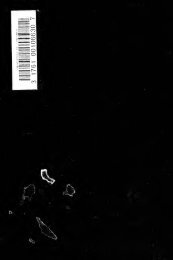Chau Ju-Kua - University of Oregon Libraries
Chau Ju-Kua - University of Oregon Libraries
Chau Ju-Kua - University of Oregon Libraries
You also want an ePaper? Increase the reach of your titles
YUMPU automatically turns print PDFs into web optimized ePapers that Google loves.
108 BAGHDAD. 1,20<br />
Golius (1596-1GG7) is quoted in Hettinger's Bibliotheca Orientalis, 62, as having referred to<br />
Elias III as ((Patriarch <strong>of</strong> Antiochn, but Assemani ridicules the idea, because he says, the title<br />
((Patriarch <strong>of</strong> Antioch» was never claimed by the Kestorians (see supra, p. 105, line 46).<br />
8) Mahmud <strong>of</strong> Ghazni is wrongly reputed to have been the first sovereign prince to take<br />
the title <strong>of</strong> Sultan, in 1002 A. D. It was later on borne by Togrul beg and the succeeding Seldjuk 5<br />
princes. See de Guignes, Hist, des Huns, II, 162. In 1057 Togrul was made General <strong>of</strong> the Empire<br />
and Governor <strong>of</strong> all the Moslim by the Caliph. In 1072 the Sultan Malekshah was given by the<br />
Caliph the title <strong>of</strong> Amir el-Mumenin, which had only been borne by the Caliphs until then. On the<br />
other hand the Caliphs were confirmed in their title by the Sultans. Ibid. II, 197—198, 214.<br />
In the time just preceding the year 1178, when Ch6u K'il-fei's work appeared, the Caliphs 10<br />
<strong>of</strong> Baghdad were politically powerless, though they continued to be the spiritual rulers <strong>of</strong> the<br />
Moslim world. The political masters <strong>of</strong> Baghdad itself were the Seldjuk Sultans, descendants <strong>of</strong><br />
the great Malekshah. But even their power had begun to decline, and it seems doubtful which<br />
<strong>of</strong> the several rulers bearing the title <strong>of</strong> Sultan in Ch6u K'il-fei's time is referred to by that<br />
author. Possibly Saladin, who had captured Damascus and other Syrian cities, called himself 15<br />
'Sultan' on his coins, and gave orders '<br />
that in the mosque prayers the names <strong>of</strong> himself and<br />
the Caliph <strong>of</strong> Baghdad should be mentioned. "When Elias III was elected Patriarch <strong>of</strong> the Nesto-<br />
rians, Mustadi was Caliph (see Mar Amr, op. cit., 64); the Seldjuk Stittans immediately preceding<br />
this period were Arslan and Togrul. See E. G. Browne, in J. R. A. S., 1902, 873-882.<br />
Under the Seldjuk Sultans, the country was divided among numerous Emirs as feudal 20<br />
lords, who had to deliver an annual tribute to the Sultan and who, in times <strong>of</strong> war, had to fit out<br />
certain troops for service under the Sultan. Hence the remark that 'he orders the Ta-shi, etc.'.<br />
See von Kremer, Culturgesch. des Orients, I, 254.<br />
9) In Chou K'il-fei's work there follow here the references to T'ien-chu being a dependency<br />
<strong>of</strong> Ta-ts'in and to the holy-water which quiets the -waTes; which our author has transposed to 35<br />
the beginning <strong>of</strong> his chapter on T'ien-chu, see infra, p. 110 line 30 and p. 111. lines 7— 9.<br />
10) Chou K'il-fei probably took this reference to the gem called hie-ki-si from the Hou-<br />
Han-shu, 1 18, where it is found mentioned for the first time. If the hie-ki-si was a gem, it probably<br />
belonged to the same class as the ye-huang-pi or 'jewel that shines at night', which is said to<br />
have been a product <strong>of</strong> Ta-ts'in. See Hirth, China and the Koman Orient, 79 and 242. See also 30<br />
infTa. Pt. II. Ch. XLI. Kote.<br />
11) The date here given is apparently a misprint, the Hou Han-shu gives the correct date,<br />
ninth year <strong>of</strong> the yen-hi period', i. e. 166 A. D. See on this famous mission from Marcus Aurelius<br />
Antoninus, Hirth, op. cit., 42 and 173. Cf. supra, p. 5.<br />
12) Quotation from Tsin-shu, 97. See Hirth, op. cit., 45. 35<br />
13) Quotation from H6u Han-shu, 118. See Hirth, op. cit., 42-43, 291—293. The<br />
Weak-Water, as well as the other terms usually mentioned together with it, the Si-wang-mu,<br />
the Bed Water (Ch'i-shui) and the Flying Sands (Liu-sha), appear in very old Chinese legends,<br />
and, although it would be a fruitless task to seek to ascertain their actual whereabout (cf. F. AV.<br />
Mayers, Chinese Readers Manual, Nos. 236, 330, 572), so much is certain, that these imaginary 40<br />
abodes <strong>of</strong> a fairy queen were, according to the ideas <strong>of</strong> the original legend writers, neither in<br />
T'iau-chi nor in Ta-ts'in. See also Hirth, Ancient History <strong>of</strong> China, 144— 151.<br />
14) Tu Huan, the author <strong>of</strong> the King-hing-ki, was made a prisoner by the Arabs in the<br />
battle <strong>of</strong> Taras in 751 A. D., and lived among them for ten years, and, when released, returned<br />
to Canton by sea. The King-hing-ki is an ethnographical work, fragmentsonly <strong>of</strong> which have been 45<br />
preserved in the commentary <strong>of</strong> the T'ung-tien (^ M.. Chs. 191—193), the author <strong>of</strong> which,<br />
TuYu(Jg;2 T/b), was his relative.<br />
Tu Huan's account <strong>of</strong> Fu-lin throws a still better light on our identification <strong>of</strong> the coimtry<br />
with Syria than the statements <strong>of</strong> the standard Chinese historians, because it was written by a Chinese<br />
author who had resided in Western Asia during a clearly definable period (751—762 A. D.) thus 50<br />
giving us an opportunity <strong>of</strong> comparing notes with information from contemporaneous western<br />
sources. Chan ("^ Canton dialect, Shim), in the west, (not north or north-west), <strong>of</strong> which Fu-lin is<br />
to be looked for, is a transcription <strong>of</strong> Sham, or ash-Sham, ((that which is on the left hand (looking

















